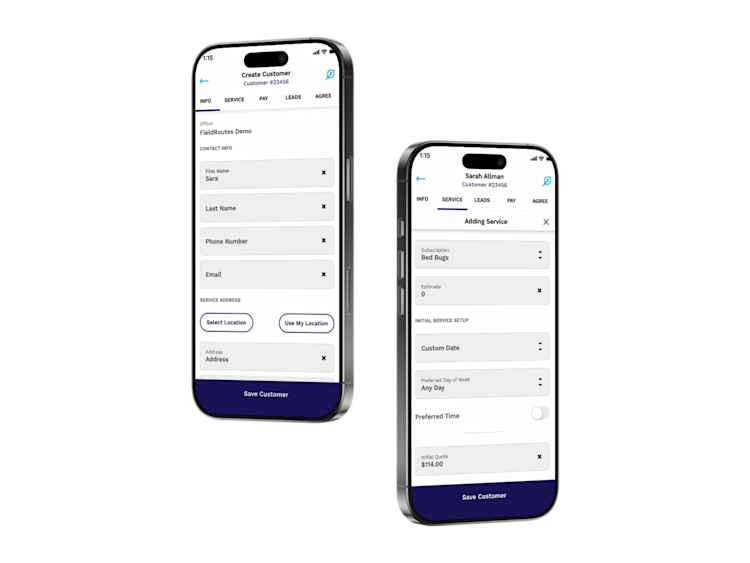How to Increase Pest Control Sales – Top Tips & Strategies

Pest control companies in the USA face numerous challenges in growing their business and staying ahead of the competition.
This blog will provide actionable tips and strategies to increase pest control sales and address these challenges:
Find new customers
Close more sales
Compete effectively
Additionally, we’ll explore how the FieldRoutes Operations Suite can help streamline processes and boost your sales metrics.
How Can I Get More Pest Control Customers?
Any business must establish a robust marketing strategy to convert leads into customers successfully. Start by clearly defining your target market, which will shape your brand identity and voice. Consider the homeowners or businesses most likely to require your services.
Then, distinguish your business from competitors by emphasizing your unique products and services on your website. Design the site with your target audience in mind, ensuring it is user-friendly and features clear calls to action (CTAs) like “contact us” or “book a consultation.”
In addition to your website, utilize social media platforms like Facebook and LinkedIn to share valuable pest control tips with your followers. Run promotional campaigns or PPC ads, such as Facebook or Google Ads, to drive traffic to your website.
Traditional marketing materials, such as print advertising and direct mail, can also be effective depending on your target audience. These methods may not have the extensive reach of digital marketing efforts, but they can still connect with potential customers who cannot be targeted digitally.
What are some best practices for increasing pest control sales?
Increasing pest control sales requires a strategic approach and refined marketing tactics. Here are 15 top tips and strategies to reach your sales goals.
1. Make Sure You Have a Plan in Place
A strategic plan is essential for a successful pest control business. A well-executed plan will boost pest control sales and help you stand out. Set SMART goals:
Specific
Measurable
Achievable
Relevant
Time-bound
Use the model above to clearly define your target market and develop a sales process that outlines steps from lead generation to closing sales.
Include scripts for initial contact, follow-ups, and handling objections. Invest in training so your sales team can stay updated on the latest sales techniques and trends in the pest control industry.
Review and adjust your marketing plan regularly based on performance data and feedback. This ensures your pest control marketing strategies remain effective and aligned with business goals.
2. Build a Professional Website
A strong online presence is vital for your pest control company to attract new business. A professional website is one aspect of your marketing strategy. Think of it as your online business card, so ensure your site is visually appealing and easy to navigate on both desktop and mobile (mobile-friendly).
Include essential information:
Services offered
Pricing
Customer testimonials
Contact information
Use clear calls to action to guide visitors toward booking your pest control services. Don’t forget to
Implement search engine optimization (SEO) techniques to improve search results' visibility.
Update your site regularly with fresh content to keep it relevant. A blog is one example of a good content marketing strategy.
Highlight your expertise and build trust with potential clients by listing customer reviews of your services.
(More on how to do this below).
3. Establish a Social Media Presence
Social media marketing is key for connecting with potential customers. Create professional profiles on popular social media platforms like Facebook, Instagram, X (formerly Twitter) and LinkedIn.
Consistently post engaging content such as:
Pest control tips
Behind-the-scenes situations
Customer success stories
Referral programs & partnerships
Because organic social media reach is very limited, you must use social media advertising as part of your digital marketing efforts to reach a broader audience.
To attract new customers, target your ads to specific demographics. For example, you can target homeowners in a certain location or households with incomes over a certain threshold.
Use analytics tools to track the performance of your social media campaigns and adjust your targeting based on data.
A strong social media presence boosts your pest control business and enhances your overall marketing efforts.
4. Create a Pest Control Blog
Creating a pest control blog is a powerful way to attract new customers and establish your authority in the industry. A blog packed with resources and tips allows you to share valuable information, answer common questions, and showcase your expertise.
Firstly, identify topics that are relevant to your audience. For example:
Common pest problems, prevention tips, and detailed explanations of your services make great blog posts.
Address seasonal issues and local pest trends to provide timely content. Creating a content calendar is a perfect way to ensure you are prepared for seasonal blog posts.
Use keywords strategically to enhance your search engine optimization (SEO) efforts. This will help your blog posts rank higher in SERPs (Search Engine Results Pages), making it easier for potential customers to find your content.
You can use free tools like Google Keyword Planner to identify the best keywords, but in our experience, it is better to use paid tools like SEMRush or Ahrefs to find topic clusters. Thus, you can find more topics to write about than just keywords.
When you begin writing your blogs, ensure they are to the point, don’t use complicated jargon, and keep your audience engaged.
For instance, use subheadings, bullet points, and images to break up the text and keep readers interested. High-quality visuals can also help illustrate your points and make your blog more attractive.
To increase your blog's reach, promote it on social media and through email newsletters. Encourage readers to share your posts and engage with your content by leaving comments.
5. Invest in Search Engine Optimization
Investing in SEO is crucial for increasing your pest control company’s visibility.
Conduct keyword research using the above SEO tools to identify terms your target audience uses.
Incorporate these keywords into your website content, meta descriptions, and headers. Optimize your site’s structure and ensure it loads quickly on desktops and mobile devices.
SEO is more than keywords and content; it is also about the technical aspects. For example, if a website takes forever to load or is hard to navigate, users will quickly abandon it in favor of a competitor.
Effective SEO drives more qualified traffic and conversions for your pest control business. If you are struggling to get leads from other digital marketing efforts, consider the role of search engine marketing as a complementary strategy.
6. Improve Local SEO
Local SEO helps your pest control business attract local customers.
To begin improving your local SEO, begin by optimizing your Google Business Profile, ensuring it contains:
Accurate contact information
High-quality photos
Positive reviews (or replies to negative ones)
Updates about new offers or seasonal campaigns
Once your Google Business Profile is done, work on other local directories like Yelp or local business websites.
Use schema markup to provide detailed business information to search engines. Improved local SEO enhances your visibility in local searches and drives more business.
Remember to regularly update your local listings to keep information current and accurate.
7. Optimize Your Google Business Profile
Optimizing your Google Business Profile is essential for local search visibility. Ensure your profile includes the following:
Accurate business name, address, and phone number (matching what is listed on your website)
High-quality photos of your team and services
Regularly update your profile with posts about promotions, events, and pest control tips.
Respond to all reviews promptly to build trust and demonstrate your excellent customer service.
An optimized Google Business Profile attracts more local customers to your pest control services.
8. Invest in Pay-Per-Click (PPC) Ads
PPC ads are effective for driving targeted traffic to your pest control website. Using platforms like Google Ads and Bing Ads to set up targeted campaigns, you can quickly drive traffic to your website while your local SEO efforts improve.
Plus, PPC Ads can be used when you wish to run a particular campaign. For example, maybe your customers in a particular area have issues with termite infestations. You can run a campaign that shows your ads when homeowners search for “termite exterminator.”
Another tip is using ad extensions to include additional information like your phone number and customer ratings, allowing the searcher to call you immediately.
Lastly, beware of ad fatigue; regularly update your ad copy and images to keep your brand fresh in the minds of your target audience.
9. Build a Strong Branding Presence
A strong branding presence distinguishes your business from your competitors. Develop a unique brand identity with:
A memorable logo
Consistent color scheme
Clear brand voice
Ensure your branding is visible on your website, social media, business cards, and vehicles. Back up your visual presence with branded marketing materials like videos and infographics to educate and engage your audience.
Share stories about your company’s values and successes to connect emotionally with customers.
Strong branding builds trust and loyalty, attracts new customers, and fosters long-term relationships. This is particularly important for new small businesses. To reinforce your brand identity, consistently communicate your brand’s message across all channels.
10. Monitor Your Online Presence
Monitoring your online presence is crucial for maintaining a positive online reputation and addressing customer concerns promptly.
Set up Google Alerts for your company name and relevant keywords to receive notifications when your business is mentioned online. This helps you stay informed about online reviews, comments, and discussions related to your company. You need to know what potential customers are reading about your small business.
Regularly check review sites like Google My Business, Yelp, and Better Business Bureau to see what customers say about your services. Respond to reviews promptly, thank customers for positive feedback, and address concerns in negative reviews.
Use social listening tools to monitor mentions of your brand on social media. Engaging with customers on social media can enhance your reputation and show that you value their feedback.
Implement a feedback loop where customer feedback is reviewed and used to make improvements. This proactive approach ensures you address issues quickly and continuously improve your services.
11. Get Customer Reviews
Customer reviews are powerful tools for building trust and credibility. Positive reviews can influence potential customers’ decisions and enhance your company’s reputation.
Encourage satisfied customers to leave reviews on popular platforms like Google, Yelp, and Facebook. After completing a service, follow up with customers via email or SMS, thanking them for their business and requesting a review.
In your follow-up messages, provide direct links to your review profiles to make it easy for customers to leave reviews. The simpler the process, the more likely customers are to leave feedback.
Showcase your positive reviews on your website and social media profiles. Highlighting customer testimonials can reassure potential customers of your service quality and reliability.
Respond to all reviews, both positive and negative, in a timely and professional manner. Thank customers for positive reviews and address any issues raised in negative reviews with a solution-oriented approach. This demonstrates your commitment to customer satisfaction.
Incentivize reviews by offering small discounts or promotional offers for customers who leave feedback or ask them to join your referral program. Ensure these incentives comply with platform guidelines to avoid any issues.
12. Run SMS and Email Marketing Campaigns
Running SMS and email marketing campaigns can effectively reach and engage your customers. These direct communication channels allow you to send personalized messages, promotions, and updates about your services.
Start by building a database of customer contact information with their consent. Segment your audience based on service history, location, and preferences to send targeted messages that resonate with each group.
Craft compelling messages that provide value to your customers. For email campaigns, use engaging subject lines to increase open rates. For example, use subject lines like pest control tips, seasonal promotions, and service reminders. Always personalize your emails by addressing recipients by name and tailoring content to their needs.
For SMS marketing, keep messages short and to the point. Use SMS for appointment reminders, exclusive offers, and urgent updates. SMS messages have high open rates and can quickly reach customers with timely information.
Automate your campaigns using marketing software to ensure timely delivery and consistency. For example, automation within FieldRoutes boosts sales and marketing efforts and translates to new business.
13. Don’t Discount Conventional Marketing Tactics
While digital marketing is a winning strategy, conventional marketing tactics still play an important role in attracting customers.
Combining traditional and digital strategies can maximize your reach and impact. Conventional marketing can enhance your visibility in the local community and attract customers who prefer traditional media and may not use the devices you leverage to target with online advertising.
For example, you could:
Use direct mail campaigns to target local customers. Send them postcards or flyers with special offers and information about your services.
Advertise in local newspapers, magazines, and community bulletins.
Use vehicle wraps and signage to advertise your business. Branded service vehicles act as moving billboards, increasing your visibility as your team travels to service appointments. Eye-catching designs and clear contact information can attract attention and generate leads.
The above are just some marketing ideas for your pest control advertising campaign.
14. Actively Engage in the Local Community
Actively engaging in the local community helps build your reputation and fosters strong relationships with potential customers. Community involvement shows that your business is invested in the local area and provides visibility to your services.
You could:
Sponsor local events, sports teams, and community organizations. Sponsorships can increase your visibility and demonstrate your commitment to supporting the community.
Participate in local events and trade shows to showcase your services. Setting up a booth at community fairs, home shows, and other events allows you to connect with potential customers face-to-face. Provide informative brochures and promotional items to leave a lasting impression.
Host educational workshops and seminars on pest control topics. Offering free educational sessions can position your company as an expert in the field and attract potential customers interested in learning more about pest prevention and control.
Network with local businesses and join community organizations. Building relationships with other business owners and community leaders can lead to referrals and collaborative marketing opportunities.
Support local schools by offering educational programs or sponsoring school events. This will help the community and increase your visibility among local families.
Share your community involvement on your website and social media profiles. Highlighting your efforts can attract like-minded customers and show that you are an active and responsible community member.
By actively engaging in the local community, you can build a positive reputation, establish strong relationships, and attract more customers to your pest control business.
15. Utilize pest control software
Implement pest control software like FieldRoutes to support your sales team. Choose a user-friendly platform to ensure it has an immediate impact.
Key features to support your sales metrics should include a CRM, marketing automation capabilities, sales reporting, and email and text campaign execution. Compare different options to find the one that best meets your business needs.
During the onboarding process, remind salespeople to use the CRM consistently. Assist them by inputting contact information and notes on interactions with potential leads.
Utilizing these 15 top tips and strategies can transform your pest control business by increasing the amount of pest control leads you can get. Next, we’ll explore how to increase sales and drive growth effectively with these strategies.
Increase Pest Control Sales and Drive Business Growth
Pest control companies can boost sales and stay competitive by optimizing their online presence, engaging with their community, and leveraging advanced technology tools. They should also regularly update their strategies to reflect industry trends.
Whether a small or fast-growing business, you can apply these strategies to your marketing efforts to boost your profit margins.
Why not visit our blog for more pest control marketing ideas? You’ll discover how FieldRoutes’ pest control software can help you close more deals and dominate your market.
While you read our resources, we also encourage you to schedule a free demo of FieldRoutes so you can examine how the software, aligned with your marketing strategy, can increase pest control sales.





![10 Pest Control Tools Every Technician & Company Needs [2025]](https://images.ctfassets.net/7i0yc949tatx/7cqTUOBQEUPSU4570lOSRf/be27fcb0297c1dd6fcab89b0a53094a7/FRT-Blog-Best-Pest-Tools-0623-PL.jpg?w=720&h=360&fl=progressive&q=100&fm=jpg)